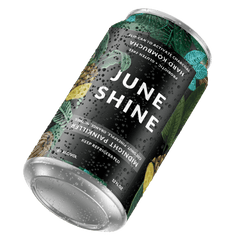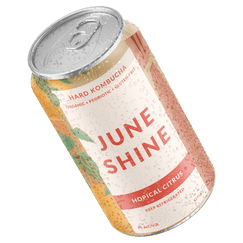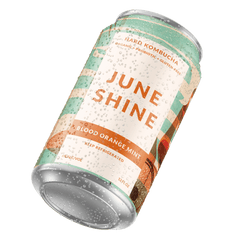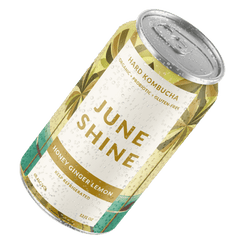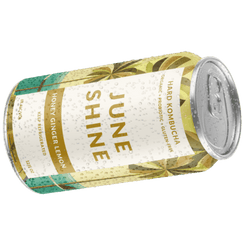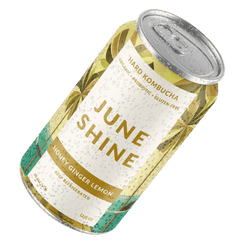Organic Cane Sugar: The Better Choice

Sugar gets a bad rap, but it also regularly appears in the food we eat. In fact, even a balanced diet is going to include some sugar, if we’re going by the food pyramid (hello, fruit!). In reality, a bit of certain kinds of sugar isn’t that bad for you. In the same way that not all saturated fats are harmful, not all sugars are created equal.
The real issue here is eating too much of the wrong sugars. More health risks are associated with using cheap, table sugars and refined sugars than sampling the occasional sweet treat made with organic sugar.
Besides, who doesn’t love their sweets? The average American consumes 22 teaspoons of sugar a day, usually refined sugar. If people weren’t meant to consume sugar, why do we crave it so much?
Here at JuneShine, we choose organic cane sugar, a high-quality, unrefined sugar with a smooth, mild flavor and a subtle aroma.
What Does Organic Cane Sugar Taste Like?
The flavor of organic cane sugar is pretty similar to any other sugar. Breaking news: sugar is sweet.
However, organic cane sugar is a bit unique. Each crystal contains natural molasses, which causes the sugar to be a little smokier and a little richer. This type of sugar has a smell, thanks to the molasses. Like how it tastes, organic cane sugar smells sweet, a bit sour, and just the right amount of earthy.
Organic cane sugar also has a grainier texture than refined, inorganic sugars. Less processing equals less grinding of the crystals.
This sugar carries a blonde, almost yellow hue to it, too. It’s sugar with personality. With the same level of sweetness and no sacrifice in flavor, there’s no reason you should be using table sugar instead of organic cane sugar.
Refined Sugars vs. Unrefined Sugars
When it comes to your health, it’s best to consume unrefined sugars, as they are void of the cancer-contributing, environmentally harmful pesticides of refined sugars like white sugar.
Refined Sugar: Your Fake-Nice Friend
Refined sugars are usually used to add flavor to foods and beverages. They contain almost no vitamins, minerals, proteins, fats, or fibers. Empty calories? Hard pass.
These types of sugars are most frequently used in heavily processed foods. If you take a stroll down the frozen foods section of your local supermarket and read some of the ingredient lists, you’re guaranteed to find a ton of refined sugars. Refined sugar is like that friend who’s super sweet to your face, but talks smack behind your back. They seem nice on the surface, but you’re not really getting anything out of that relationship.
Unrefined Sugar: Your Cool, Sweet New Neighbor
Meanwhile, natural or unrefined sugars are typically found in foods rich in nutrients such as milk, which contains a number of health-boosting nutrients like vitamin D, vitamin B12, potassium, phosphorus, selenium, and more.
Organic cane sugar provides the same sweetness and richness as refined sugars. This white sugar alternative contains 17 amino acids, 11 minerals, and six vitamins, including important antioxidants that may help treat oxidative damage. It’s like your cool new neighbor who just so happened to bake you a tray of cookies and helped you move in. They’re nice, and they’re real.
Organic cane sugar is made from sucrose, fructose, and glucose, while refined sugar is just made up of sucrose and unneeded calories. Refined sugars also may contain chemicals used in the refining process like lime, sulfur dioxide, and phosphoric acid.
Organic Sugars vs. Inorganic Sugars
Try to only eat organic sugars. Not only do they contain a myriad of vitamins and minerals like calcium, potassium, magnesium, manganese, and iron, they’re also packed with essential amino acids like pipecolic acid, methionine, tryptophan, and arginine.
These amino acids help you burn fat and grow muscle. Organic sugars are also high in polyphenols, which act as potent phytonutrients, as well as antioxidants. That’s a whole lot of science to say that it’s way better for you than inorganic sugar.
Only organic farming techniques are used in the production process of this sugar cane, including in crop rotation. Through this practice, the health of the soil is improved, nutrients within the soil are optimized, and the plant becomes better equipped to fight off pests and weeds.
Overall, organic sugar contains significantly fewer synthetic chemicals, pesticides, and fertilizers than inorganic sugar. These substances are very damaging to your body, and they’re also terrible for the environment. Long story long, switching up how you handle your sweet tooth can help you and the environment.
Everything In Moderation: Watch Your Sugar Intake
Organic cane sugar is considerably healthier to consume every day than refined and inorganic sugars. But don’t go crazy. Moderation is key.
The American Heart Association says that men should not go over their daily limit of nine teaspoons of extrinsic sugar. This is equal to about 150 calories. For women, it is recommended not to consume over six teaspoons of added sugar a day. That’s equivalent to 100 calories.
The World Health Organization says that sugar should only make up 5% of a person's total diet for both adults and children. That’s about 20 pounds of sugar a year.
Consuming too much sugar can also lead to a sugar rush or sugar headache. When your body takes in large amounts of sugar, it produces high doses of insulin to combat it. Externally, you feel a burst of newfound energy. Inwardly, the level of sugar in your blood is dropping fast. Once it gets low enough, your sugar high will come to an end, causing you to crash.
Some people experience severe dizziness and headaches from eating too much sugar. Others feel queasy and sick to their stomach. This drastic decline in sugar in the body can also lead to mood swings.
High sugar consumption also can cause you to put on some extra pounds. While this may not seem that serious, it can become serious down the line, so it’s something to keep an eye on.
Conclusion
If you’re going to eat sugar, be smart. Make sure it’s the right type of sugar. It’s not necessarily wrong to say that sugar is unhealthy. It is pretty misunderstood, though.
Sources:
5 Proven Health Benefits of Milk | Healthline
Crop Rotations | Rodale Institute
American Heart Association | To be a relentless force for a world of longer, healthier lives
